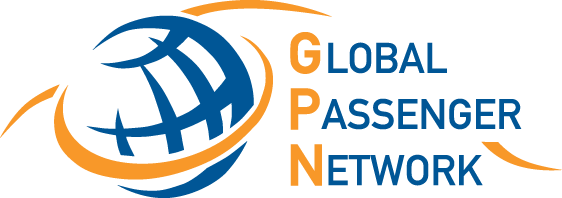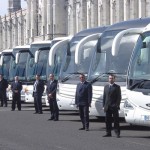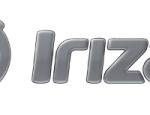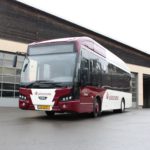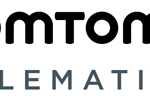RDA AGM & Annual Conference 26th – 28th April 2012 in Graz – Steps towards Europe
This year’s RDA AGM was held in the Austrian Steiermark in the beautiful and historic Graz Congress Center. RDA President Richard Eberhardt’s presidential address was followed by RDA CEO Dieter Gauf’s summary report on activities and developments since the 2011 AGM in Hamburg and by RDA Treasurer Bernhard Kirschbaum’s financial report.
The RDA Board of Directors was unanimously acquitted by the membership. Elections were held: Konrad Behringer was confirmed as RDA Vice-President, Hannes Staggl and Heinrich Marti were re-elected as members of the RDA Board of Directors for another three-year term as well. The first day ended with a pleasant evening in a sunset panorama restaurant situated in the grounds of the Schlossberg castle high above the world-famous red rooftops of Graz.
Day two was dominated by three central themes: personnel management, professional development and European perspectives. The over 200 participants were officially greeted by Mr. Othmar Karas, Vice-President of the European Parliament. He promised to continue looking after coach tourism interests. Only in the past week had tax increases on diesel fuel been rejected by the European Parliament. Coach tourism, he said, brought people in Europe together and in doing so made a valuable contribution to European identity and cohesion.
RDA President Richard Eberhardt stated that we could no longer conceive of daily life and work in Europe without consideration of this year’s conference motto “Steps towards Europe”. Europe was a natural home for all involved in coach and group tourism. Europe, however, was both a chance and a risk. Brussels was currently a synonym for additional burdens, excessive bureaucracy and over-regulation. Instead, Brussels should provide impulses for progress, prosperity and innovations. Special coach tourism concerns included additional charges for coach access, barriers to free access to city centres and visitor attractions and undifferentiated treatment of coaches in EU legislative processes, especially vis-à-vis goods transport vehicles. Chances were available everywhere where companies could freely operate, in places where fresh ideas and positive energy was appreciated and well received.
Future personnel shortages and how to make our industry more attractive to young people was a major theme discussed by Prof. Dr. Volker Stein, Siegen University Commerce Dept., and Martin Wendlandt, coach business consultant for forty years and industry expert . Prof. Stein stated that major challenges for the tourism sector still lay ahead. The crux of the matter was to recruit, motivate and retain qualified staff. Personnel should not be reduced to a simple cost factor but viewed as capital and human assets – the very basis of future business success.
Martin Wendlandt illustrated how coach companies were being hit by current demographic changes. The number of coach drivers over 55 years of age had increased rapidly – and drivers were essential for this particular business. Coach operators should employ more females and migrants and take-pro-active measures to actively recruit and train necessary personnel, e.g. via online advertising and banners on coaches. Training and further development were crucial areas that had hitherto been largely ignored – especially by smaller enterprises. A positive image of the sector in the public realm is essential and of utmost importance in attracting new people. There is no shortage of competition in Europe for potential employees and clever individuals. Given the familial and flexible nature of medium-sized coach holiday enterprises, this is a challenge that was by no means insurmountable. Young people, in particular, should also be actively spoken to via their social media networks.
This highly topical subject was followed by the whole issue of dismantling bureaucracy and bureaucratic hurdles to carrying out coach holiday business in Europe, e.g. environment zones and coach lockouts. Speakers included Prof. Dr. Tim Sterzenbach from Worms University of Applied Sciences Tourism Dept. In order to effect solutions, it was important that the RDA continue with its lobbying initiatives at all levels and that a positive image of our branch be inculcated into the hearts and minds of officials who made decisions which directly affected the operations of our industry and its business effectiveness. The former Minister-President of the Federal German State of Thuringia, Mr. Dieter Althaus, elucidated upon the political dimensions of dismantling bureaucratic hindrances and the importance of citizens and bureaucracies working together – from local to EU levels – to communicate with each other to solve problems and realize future opportunities.
Ms. Mag. Beate Appinger-Ziegler explained the workings of Austrian road toll ASFINAG while Mr. Mag. Paul Blachnik re-iterated the position of coach companies. Mr. Christian Leetz, from the editorial team of the Westdeutsche Allgemeine Zeitungsgruppe WAZ and Mr. Sepp Zotter, owner of Zotter chocolate factory in Riegersburg, discoursed upon the more pleasant and culinary aspects of travelling by coach. The second evening was rounded off in the heart of old Graz with an absolutely splendid gala dinner in the aula of the historic University of Graz, accompanied by excellently under-stated, highly humorous and wonderfully delivered live entertainment.
The 62nd RDA AGM and joint RDA / gbk Conference will take place from 11th to 13th April 2013 in the southern German and medieval city of Augsburg.
